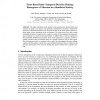Free Online Productivity Tools
i2Speak
i2Symbol
i2OCR
iTex2Img
iWeb2Print
iWeb2Shot
i2Type
iPdf2Split
iPdf2Merge
i2Bopomofo
i2Arabic
i2Style
i2Image
i2PDF
iLatex2Rtf
Sci2ools
108
click to vote
MABS
2007
Springer
2007
Springer
Trust-Based Inter-temporal Decision Making: Emergence of Altruism in a Simulated Society
This paper contributes to the analysis of the question how altruistic behaviour can be in an agent’s own interest. The question is addressed by involving a temporal dimension in which altruist behaviour at one point in time can be in the agent’s interest at a future point in time, depending on the environment. The claim is that to be able to make reasonable decisions, an agent needs a cognitive system for intertemporal decision making, in relation to a model of the environment. To address this, a society of agents has been modelled, simulated and analyzed. Some of the agents have a cognitive system including a model of the environment based on a dynamic model for trust in other agents. This environment model is combined with a model for intertemporal decision making. Agents with this cognitive system show more altruistic behaviour, they get a larger social network, and become in the end more healthy than agents without such a cognitive system.
| Added | 08 Jun 2010 |
| Updated | 08 Jun 2010 |
| Type | Conference |
| Year | 2007 |
| Where | MABS |
| Authors | Tibor Bosse, Martijn C. Schut, Jan Treur, David Wendt |
Comments (0)

